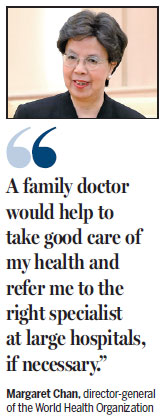Reforms crucial for sustainable care, experts say
Updated: 2016-08-05 08:02
By Shan Juan(China Daily)
|
|||||||||
On a recent work trip to China, Margaret Chan, director-general of the World Health Organization, said she hopes a well-trained family doctor will be available to provide medical services when she retires.
Chan, who is scheduled to leave her post in October 2017, said she will probably return to Hong Kong, where she was born and raised.
"A family doctor would help to take good care of my health and refer me to the right specialists at large hospitals, if necessary," she said.
Family doctors are the key to China's primary healthcare services and a hierarchical system the authorities are desperate to introduce to ensure the medical system becomes more sustainable and accessible. The ongoing reforms should solve that problem, she added.
Du Xueping, head of the Chinese Medical Doctor Association's general practice committee, said the need for reform is demonstrated by the fact that many community-level public clinics are empty, but large hospitals are crowded.
Zhang Deming, deputy director of the Ya'an People's Hospital in Sichuan province, said disorganized and unregulated medical practices mean 90 percent of patients seen by the hospital's leading specialists have only minor ailments.
"It's a waste of expert resources and patients' money," he said, adding that robust primary care backed up by qualified family doctors is the only solution to the problem.
"They can take care of most of the patients at the grassroots level and refer only the critically ill to large hospitals," he said, adding that family doctors target general health and not just illness.
Facing the double challenge of a rapidly aging population and a rise in chronic diseases, "prevention matters even more than treatment in the long run", he said.
Meanwhile, non-communicable diseases have replaced infectious diseases as the greatest health threat to Chinese people, accounting for more than 80 percent of the 10.3 million deaths every year, according to a joint study published in July 22 by government departments, including the National Health and Family Planning Commission and the Ministry of Human Resources and Social Security, and the World Bank and WHO.
Non-communicable diseases are exacerbated by high-risk behavior, such as smoking, sedentary lifestyles and consumption of alcohol, and by environmental factors such as air pollution. At the same time, with China's recent higher economic growth and rising personal incomes, people are demanding more and better healthcare, the report said.
According to Du, of the doctors' association, those factors have led to rising healthcare costs, but as China's economy slows, it will be difficult to maintain the current level of growth in healthcare spending.
The study makes an urgent case for reform and the introduction of an integrated, "people-centered" healthcare system to meet new challenges. The family doctor system will be central to realizing that aim, she said.

(China Daily 08/05/2016 page6)
Today's Top News
London unveils new anti-terror unit amid knife attack
Bank of England cuts rates to record low, restarts QE
Woman killed, five injured in London knife attack
Fury at Republican Party over Trump snub of Ryan
Ukraine's Savchenko on hunger strike
Chinese tourists robbed in France
5 feared dead as Russian helicopter shot down
China influence can soften blow of Brexit
Hot Topics
Lunar probe , China growth forecasts, Emission rules get tougher, China seen through 'colored lens', International board,
Editor's Picks

|

|

|

|

|

|







